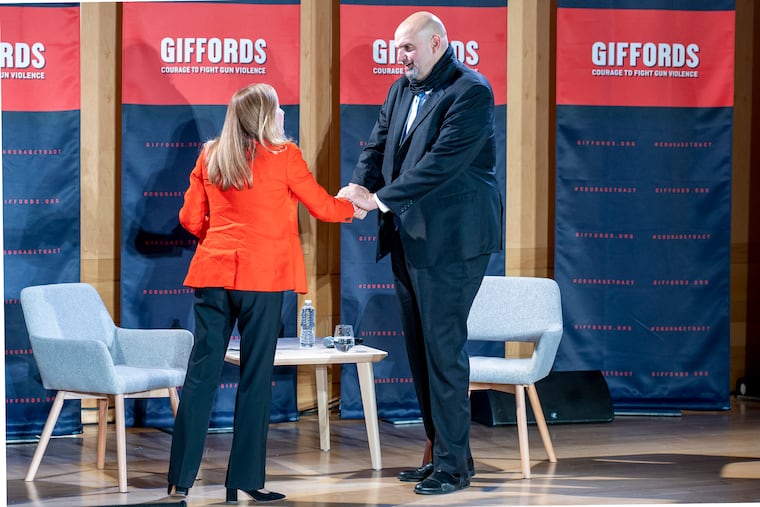Pa. Democratic Senate candidates came to Philly to talk about gun violence. Here are 3 takeaways.
All said they’d back expanding background checks, limiting high-capacity magazines, and making it harder for people who are legally deemed dangerous to obtain guns.

It was a night of firearms, the filibuster, and Fetterman.
The three leading Pennsylvania Democratic Senate candidates appeared in Philadelphia on Monday to answer questions about gun-violence prevention in a city experiencing a shootings crisis that refuses to abate.
Lt. Gov. John Fetterman, the Democratic front-runner, touted his opposition to the filibuster and again faced questions about a 2013 incident in which he pulled a shotgun on a Black jogger whom he had wrongly suspected of a shooting. U.S. Rep. Conor Lamb promised to “bridge the divide” with gun owners. And State Rep. Malcolm Kenyatta said that as a Black Philadelphia native, he’s uniquely positioned to understand the drivers of gun violence.
The forum at the National Constitution Center was hosted by Giffords, a Washington-based gun-violence prevention group founded by former U.S. Rep. Gabrielle Giffords, who was shot in 2011.
The reality confronting Philadelphia wasn’t lost on the candidates. While gun violence has surged in jurisdictions across the state and country over the last two years, Philadelphia has experienced a record number of people injured or killed in shootings, and a recent poll showed a majority of residents see public safety as the No. 1 issue facing the city.
The trio didn’t directly debate the issues. Each candidate appeared separately to answer questions from a moderator and audience members.
Here are some takeaways:
Lamb and Kenyatta read the room
The May 17 primary is in just five weeks and the race has become newly hostile of late. But there were few fireworks Monday night.
Lamb didn’t once mention Fetterman by name, despite being the first candidate to lob a direct attack earlier this month.
Kenyatta also didn’t mention the 2013 incident, despite bringing it up during a virtual forum on Friday, when he said Fetterman lacked credibility on gun issues because he was “involved in gun violence, in a type of vigilante justice.” Fetterman, as he has long maintained, said he had been in an “active-shooter situation” and said the incident was being misrepresented.
» READ MORE: John Fetterman has a big lead in the Pa. Senate primary. Will attacks matter at this point?
Both underdogs’ tone could have been a reflection of the room.
Giffords, who still bears injuries more than a decade after being shot in the head, watched intently from the front row. Videos of emotional antiviolence activists played on repeat. And several audience members said they’d been personally affected by gun violence.
One mother clutched a photo of her late son, fatally shot in 2009.
Fetterman tries to clear the air
The moderator, former U.S. Rep. Debbie Mucarsel-Powell, asked Fetterman to describe the 2013 incident, when Fetterman was the mayor of small-town Braddock, outside Pittsburgh. He said he heard gunfire near his home, called the police, then grabbed his shotgun and chased down a man he saw running from the area. The person turned out to be an unarmed Black jogger, who said Fetterman pointed the gun at him.
Fetterman said that he never pointed a gun at anyone and that he “made a split-second decision to intercept the individual to make sure that the community was safe and protected.”
He said Monday that his rivals are misrepresenting the episode as their campaigns trail him in the homestretch, adding that “it only seems to come up when I’m running for elections like this.”
» READ MORE: We're tracking the candidates running for Senate in Pennsylvania
Fetterman focused much of his remarks on the filibuster, touting that he was the first candidate in the race to call for eliminating the Senate rule that has stymied many liberal priorities in Washington.
He said policies like expanding background checks are “basic reforms,” but “the truth is also that the way the Senate is structured, if you don’t have 60 votes, you’re not going to be able to achieve them.”
And he said perceptions that he’s “anti-law enforcement” because he’s progressive are “absolutely not true.” He said that he favors community policing models that aim to drive down crime by strengthening relationships between police and residents, and that “you can’t have true reform unless you reform the policing model.”
Lamb promoted his centrist approach while Kenyatta invoked lived experience
The candidates largely agreed on big-ticket gun-control measures. All said they’d back expanding background checks, limiting high-capacity magazines, and making it harder for people who are legally deemed dangerous to obtain guns.
All three have also said they would vote for a ban on assault weapons. Lamb voted against such a ban in 2018, saying at the time that strengthening background checks was more pressing. But he has since said he’d back a ban.
Lamb, who has campaigned as a moderate akin to Joe Biden, said Monday that he’s the person who can “bridge the divide on this issue.” He said he owns a gun, given to him by his now-father-in-law when he proposed to his daughter, because that’s “kinda how it happens in Pennsylvania.”
“I really am not someone with an agenda to come and take their firearms away,” he said, “but someone who is trying to promote being responsible.”
Kenyatta tried to position himself as the only candidate with relevant lived experience. He repeatedly invoked his perspective as a Black man who grew up in North Philadelphia, saying, “The difference is, when I go home tonight, I might have another shooting on my block.”
“This is not just something to talk about,” he said. “It’s something that when this campaign is over, when this auditorium is empty, myself and my family and the people in my community, we’re still going to be thinking about this.”